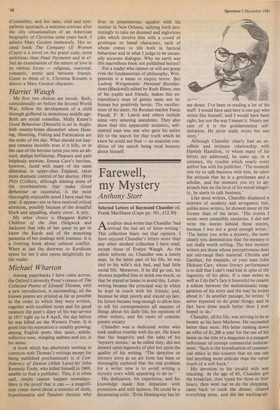Farewell, my Mystery
Anthony Storr
Selected Letters of Raymond Chandler ed. Frank MacShane (Cape pp. 501, £12.50) An editor once wrote that Chandler 'had revived the lost art of letter-writing.' This collection bears out that opinion. I have enjoyed Chandler's letters more than any other modern collection I have read, except those of Evelyn Waugh. As the editor informs us, Chandler was a lonely man. In the latter part of his life, he was tied to his wife's sick bed, and had little social life. Moreover, if he did go out, his shyness impelled him to drink too much, so that he stayed at home to avoid this. Letterwriting became the principal way in which he kept in touch with his friends; and, because he slept poorly and stayed up late, his letters became long enough to allow him to tell his correspondents all manner of things about his daily life, his opinions of other writers, and his views of contemporary society.
Chandler was a dedicated writer who took endless trouble with his art. He knew that the longevity and the sales of his 'mystery stories,' as he called they, did not depend upon ingenuity of plot but upon the quality of his writing. 'The detective or mystery story as an art form has been so thoroughly explored that the real problem for a writer now is to avoid writing a mystery story while appearing to do so.'
His dedication, his experience, and his knowledge made him impatient with pretension and with laziness. He could be a devastating critic. 'Even Hemingway has let me down. I've been re-reading a lot of his stuff. I would have said here is one guy who writes like himself, and I would have been right, but not the way I meant it. Ninety per cent of it is the goddamnedest selfimitation. He never really wrote but one story.'
Although Chandler clearly had an excellent and intimate relationship with Hamish Hamilton, to whom many of his letters are addressed, he sums up, in a sentence, the trouble which nearly every author has with his publisher. 'The moment you try to talk business with him, he takes the attitude that he is a gentleman and a scholar, and the moment you try to approach him on the level of his moral integrity, he starts to talk business.'
Like most writers, Chandler displayed a mixture of modesty and arrogance; but, unlike most writers, he showed more of the former than of the latter. 'The stories I wrote were ostensibly mysteries. I did not write the stories behind those stories, because I was not a good enough writer.' 'The better you write a mystery, the more clearly you demonstrate that the mystery is not really worth writing. The best mystery writers are those whose perceptiveness does not out-range their material. Christie and Gardner, for example, or your man John Dickson Carr, whose literary performance is so dull that I can't read him in spite of the ingenuity of his plots. If a man writes as well as I do (let's face it honestly) he creates a schism between the melodramatic exaggeration of his story and the way he writes about it.' In another passage, he writes: 'I never expected to do great things; and in fact have done much better than I ever hoped to do.'
Chandler, all his life, was striving to be as honest as his hero Marlowe. He succeeded better than most. His letter turning down an offer of $1,200 a year for the use of his name on the title of a magazine is a pungent indictment of corrupt commercial endorsement. 'Such is the brutalisation of commercial ethics in this country that no one can feel anything more delicate than the velvet touch of a soft buck.'
His devotion to his invalid wife was touching. At the age of 65, Chandler got the breakfast, then typed for three or four hours, then went out to do the shopping, came back to cook the dinner, cleared everything away, and did the washing-up.










































 Previous page
Previous page